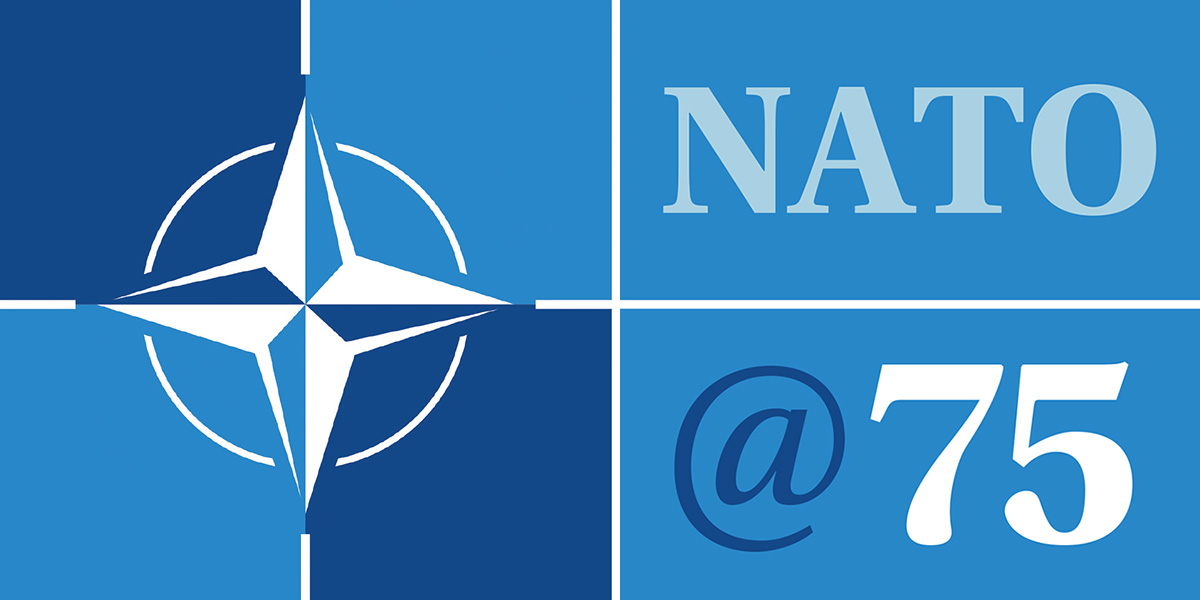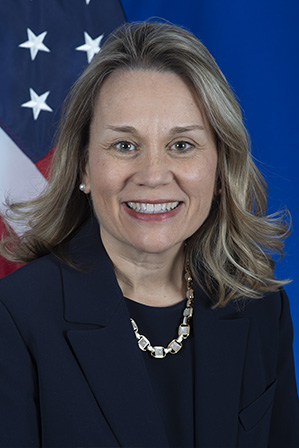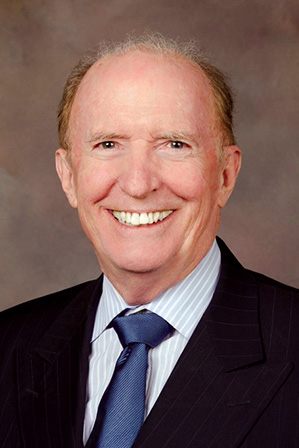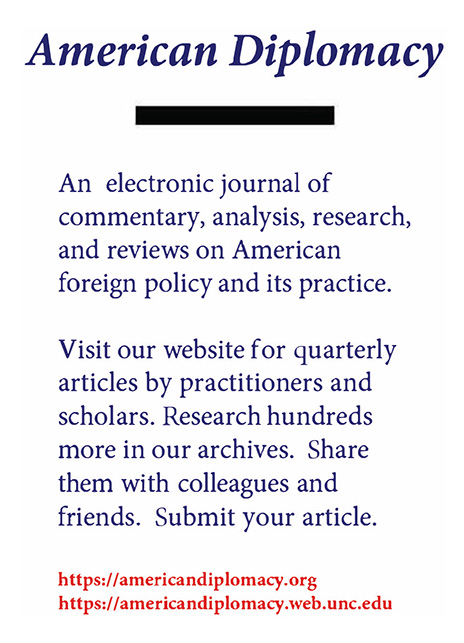NATO at 75
Reflections from U.S. Permanent Representative to NATO Julianne Smith and three former ambassadors to the Alliance: Alexander Vershbow, R. Nicholas Burns, and Robert E. Hunter

Following the July NATO Summit in Washington, D.C., and closing out 75 years of the North Atlantic Alliance, The Foreign Service Journal reached out to a number of those who have served as U.S. Ambassador to NATO with these questions: Why does NATO matter, and what value does it bring to the United States?
We are pleased to present here the messages we received from current U.S. Permanent Representative to NATO Julianne Smith and three former ambassadors to the Alliance: Alexander “Sandy” Vershbow, who served as Deputy Secretary General of NATO (2012-2016), the first American to hold that position, and earlier as the 18th U.S. ambassador to NATO; R. Nicholas Burns, the 19th U.S. ambassador to NATO; and Robert E. Hunter, the 17th U.S. ambassador to NATO.
—Shawn Dorman, Editor in Chief
NATO Today
BY JULIANNE SMITH

During my Senate confirmation hearing in the fall of 2021 to become the U.S. Permanent Representative to NATO, I outlined three chief priorities: strengthen the Alliance, revitalize America’s relationships with its closest Allies, and address some of NATO’s shortcomings (such as inadequate defense spending, capability gaps, and slow decision-making). What I had no way of knowing at the time was just how transformative the next three years would be for the Alliance. NATO’s response to Russia’s unprovoked war of aggression against Ukraine has showcased the Alliance’s value, adaptability, and resilience. NATO is now stronger, bigger, and more united than ever.
A little after 3 a.m. on Feb. 24, 2022, my phone rang. I was told that the war in Ukraine had started and that NATO would meet in an emergency session in just a few short hours. Thanks to weeks of consultations and detailed contingency planning in January and early February, NATO was ready. Within an hour, the Alliance launched both its Graduated Response Plans and elements of its NATO Response Force. Individual Allies redoubled their efforts—already set in motion weeks prior to the invasion—to reinforce the eastern flank with tens of thousands of troops and additional capabilities.
Allies condemned Russia’s actions, and every member of the Alliance pledged humanitarian, financial, and security assistance for Ukraine. NATO announced a virtual summit with Allied leaders for the next day. This was NATO at its best: Allies coming together to share intelligence both before and at the start of Russia’s war, Allies enhancing deterrence in Eastern Europe, Allies providing urgent assistance to one of their closest partners, and Allies strongly united around a common purpose.
Vladimir Putin no doubt assumed that NATO unity would start to crack, and Allies would eventually lose interest in Ukraine. This was a grave miscalculation. More than two years later, NATO Allies continue to support Ukraine in its efforts to defend its sovereignty. The Alliance has also taken a series of concrete steps to help Ukraine build a bridge to NATO membership. It lifted the traditional requirement of completing the Membership Action Plan (MAP), created the first NATO-Ukraine Council as well as a new mission for training and security assistance, established a new NATO Representation office in Kyiv, launched initiatives to help Ukraine modernize its forces, and declared that Ukraine is on an “irreversible” path to membership.
NATO is now stronger, bigger, and more united than ever.
–Ambassador Julianne Smith
Perhaps even more troubling for President Putin, the Alliance added Sweden and Finland as members, significantly increasing Russia’s land border with NATO and proving that despite Russia’s best efforts, NATO’s door remains wide open.
The dramatic changes didn’t stop there. NATO issued a new Strategic Concept in 2022 that mentioned the People’s Republic of China (PRC) for the first time. NATO members significantly increased defense spending, with 23 of the 32 Allies hitting the 2 percent target for the first time in 2024. The Alliance placed four new multinational battalions in Eastern Europe, bringing the total in that region to eight. It rolled out new regional plans that will ensure that the Alliance can protect every inch of NATO territory. NATO deepened its partnership with its four Indo-Pacific partners. And NATO has spent the past three years strengthening its tool kit to take on future challenges such as cybersecurity, emerging and disruptive tech, and space.
In July the Alliance celebrated its 75th anniversary at the Washington Summit. While parts of the summit were designed to look back at all that NATO had achieved over more than seven decades, most of the three days were about NATO’s bright future. This is, after all, an alliance that continues to attract new members. It is an alliance that continues to adapt to new challenges. It continues to get Ukraine what it needs to defend itself. And its strength continues to rest in members’ shared values and commitment to collective action.
Why Does NATO Matter to the United States?
BY ALEXANDER VERSHBOW

NATO matters for U.S. security for the simple reason that peace and security in Europe are vital to our own security and prosperity and to encouraging respect by other nations for the values on which NATO is based: liberty, democracy, and the rule of law. Americans learned after World War I the cost of disengaging from Europe and choosing the path of isolationism. The wise leaders who created NATO 75 years ago were determined not to repeat the same mistake.
NATO was formed by the United States, Canada, and 10 West European nations to provide collective security against the growing threat of a hostile Soviet Union and to alleviate instability in the wake of the devastation of Europe during World War II. NATO’s purpose as set forth in its founding treaty was to secure peace in Europe and the North Atlantic area, promote cooperation among its members, safeguard freedom, and deter external aggression.
Under Article 5 of the Washington Treaty, members pledged to treat an attack on another member as an attack on all and to take action—individually or collectively—to assist the victim of aggression to restore peace. While the threats to NATO security have changed over the past 75 years, the purpose, values, and founding principles of the Alliance have not.
I worked on NATO policy for the larger part of my 40-year diplomatic career, including 11 years at NATO headquarters. As an insider who has attended more NATO summits than I care to count, I think NATO’s enduring value lies in its remarkable ability to adapt to changing circumstances and evolving threats to members’ security.
The Alliance did not go out of business after the fall of the Berlin Wall and the collapse of the Soviet empire, as many skeptics recommended at the time. Instead, NATO went “out of area” to end the civil wars and ethnic cleansing in the former Yugoslavia, and it joined the global war against terrorism after the United States was attacked on 9/11—the only time Allies invoked Article 5.
Thanks to the vision of American and European leaders, NATO also became a key instrument for overcoming the division of Europe imposed by Stalin at the Yalta Summit in 1945. NATO laid the basis for a “Europe whole and free” after 1989 through partnership and admission of new members from the former Soviet bloc. During all this time, NATO sought a strategic partnership with Russia as part of an integrated European security system.
It will be a long time before Russia can again be considered a partner of the West and NATO. In attempting to change Ukraine’s borders by force and erase it from the map as a sovereign state, Putin’s Russia has dealt a serious blow to the European order that has underpinned peace and security since the end of World War II. Helping Kyiv defeat Russia in Ukraine is essential if the European security order is to recover. Even a partial win for Putin would be dangerous and encourage other despots to attack their neighbors.
While the threats to NATO security have changed over the past 75 years, the purpose, values, and founding principles of the Alliance have not.
–Ambassador Alexander Vershbow
Fortunately, our allies have stepped up since Russia’s initial aggression in 2014 and its full-scale invasion in 2022. Twenty-three of today’s 32 Allies now meet or exceed the 2 percent-of-GDP goal for defense spending adopted in 2014. And they have substantially increased the size and readiness of NATO forces on NATO’s eastern flank, pledging to defend “every inch” of Allied territory, including that of new members Finland and Sweden.
Allies have provided military and economic support to Ukraine on a par with the United States, showing the continuing value of having like-minded allies ready to share the burdens of defense and security. At this year’s 75th anniversary summit in Washington, D.C., NATO members took additional measures—both collectively and bilaterally—to expand defense assistance to Ukraine, increase its interoperability with NATO forces, and help it develop a strong industrial base.
These and other summit deliverables will constitute a solid bridge on which to expedite Ukraine’s future membership in NATO. In this regard, Allies understand that long-term peace and stability and security in Europe can be assured only when Ukraine has the capacity to defeat today’s Russian aggression and deter Moscow from ever attacking again, underpinned by the protection of NATO’s Article 5 guarantee.
Russia is the most immediate challenge facing NATO, but it’s not the only one. At the recent summit, Allies reaffirmed the need for NATO to multitask and address the multiple threats along its other borders—such as international terrorist groups, instability, failing states, and irregular migration. They understand that NATO must do its part to meet the increasingly global challenge from a rising China that is aligned with other revisionist powers and, like Russia, seeks to overturn the rules-based order.
All these challenges make NATO more important than ever in safeguarding the freedom and prosperity of its 32 members and the dozens of partners from beyond Europe who seek to strengthen their security through cooperation with NATO.
NATO on 9/11
BY R. NICHOLAS BURNS

Ambassador Nicholas Burns (center) confers with NATO Secretary General Lord Robertson (left) and Supreme Allied Commander General Joe Ralston on the afternoon of Sept. 11, 2001, after the attacks in the U.S.
Courtesy of Nicholas Burns

On Sept. 11, 2001, I was participating in the weekly lunch of NATO ambassadors in Brussels, having arrived only 12 days prior to take up my new position as U.S. ambassador to the Alliance. One of our local Belgian employees came into the meeting through a side door to whisper to me that a plane had hit the World Trade Center in New York.
My immediate thought was whether bad weather was involved. Had a small plane crashed into one of the towers in fog or a storm? When we heard a few minutes later that a second plane had hit the Twin Towers, we all knew it couldn’t be weather or an accident but terrorism.
NATO’s keystone principle is an attack on one Ally is an attack on all. When founded in 1949, that was the central commitment President Harry S Truman and his successors gave the European Allies during the five decades of the Cold War—the U.S. would come to Europe’s aid just as we had done in the First and Second World Wars if the Soviet Union attacked across the north German plain. That that war mercifully never came was in large part due to NATO’s massive deterrent strength.
It is thus a historical irony of 9/11 that when the Allies invoked Article 5 the next day for the first time in NATO’s history, it was Europe and Canada that came to America’s defense, not the other way around.
It took us about 18 hours to make that decision once we had heard news of the attack. NATO operates by consensus, meaning every Ally must agree with a resolution to make it official policy. It was not unusual for Allies to debate for weeks or even months before all agreed on a consequential decision.
We didn’t have the luxury of time on 9/11. If NATO was to act, it had to do so quickly and resolutely. Any hesitation would have sent exactly the wrong signal to al-Qaida as well as to the American people reeling from one of the most shocking attacks on our homeland in history.
That was the key concern as our combined State-Defense Department team huddled in my office that afternoon watching the Twin Towers fall again and again in CNN’s looped, nonstop coverage. We called but couldn’t reach the White House, State, and Defense Departments because all had been evacuated.
We worried whether every Ally would agree to, in effect, pledge to go with us to war against the organization most suspected to be behind the attack—Osama bin Laden’s al-Qaida.
The 19 ambassadors met late that evening under Secretary General Lord Robertson’s chairmanship. He asked me to speak first to report on the carnage in the U.S. I explained the terrible dimensions of the tragedy, lamenting that early estimates of the death toll were so high that Sept. 11, 2001, could turn out to be the bloodiest day in American history since the Civil War Battle of Antietam in September 1862.
Americans need not live alone in the world in bitter isolation as we have chosen too often in the past.
–Ambassador R. Nicholas Burns
One by one, each of the Allied ambassadors was asked whether they would agree to invoke Article 5. The majority gave an unequivocal yes. Some had still not received instructions from their capitals and did not expect them until the following morning. One—Denmark—had to consult its parliament.
By then, I had reported to Secretary of State Colin Powell and Secretary of Defense Don Rumsfeld as well as National Security Adviser Condoleezza Rice. We all agreed that a quick NATO decision backing the U.S. would buoy the American public and send a strong signal to terrorist groups and the world of NATO’s resolve. We also agreed that failure to act would do perhaps irretrievable damage to NATO’s credibility as the world’s strongest alliance.
Early on the following morning, Sept. 12, my team and I called each of the Allied missions. They all reported they were with us in invoking Article 5. Elated, I called Condi Rice, who was still at work in a darkened White House at 4 a.m. in Washington, D.C. I told her I needed the president’s instruction, given the stakes involved, to vote to invoke Article 5. She said the president was getting some badly needed rest following a terrible day, but that he was all for it, and I should vote accordingly.
I said I would take that as my presidential instruction and rush down to NATO’s Conference Room 1 to raise my hand in favor for the U.S. Before I could hang up the phone, Condi said to me, “One more thing. It’s good to have friends in the world.”
I’ve never forgotten her words, and I think of them on every anniversary of the 9/11 attacks, including the one just past.
America remains the world’s strongest military and economic power. What truly separates us from China, Russia, and other adversaries, however, is that we have friends in the world, democratic allies in the North Atlantic and Indo-Pacific who share our interests and values. They are America’s difference makers in the global balance of power.
During the past three years, I’ve watched from U.S. Embassy Beijing as the Alliance has united again, as we did on 9/11, this time to stand up for an embattled Ukraine against a malevolent foe in Vladimir Putin’s Russia.
NATO is the greatest alliance in modern history and is as vital to us now in its 75th year as it was at its creation at the dawn of the Cold War. The lesson we’ve learned as one of its founders and leaders is that Americans need not live alone in the world in bitter isolation as we have chosen too often in the past.
NATO is essential for our own security and to achieve our supreme national interest in a united, democratic, and peaceful global order in Europe and beyond.
Fortunately, It Did Not Go Out of Business in 1991…
BY ROBERT E. HUNTER
Si Dieu n’existait pas, il faudrait l’inventer.
—Voltaire

NATO is not as important as God, but it also can’t be dispensed with: at least not if its member states are to meet responsibilities for their security and other national interests—political, economic, and social.
For the United States, a stable, secure, prosperous, and democratic Europe, with unimpeded access and engagement across the Atlantic, is a sine qua non; it’s also necessary for pursuit of U.S. interests in other parts of the world, including Asia. Politically and instrumentally, for the United States nothing can substitute for a strong, robust, and effective NATO, which is the most important linchpin of U.S. foreign policy and enjoys the American people’s bipartisan support.
Likewise, for Europe writ large, America’s continued engagement in Europe is necessary to underpin cooperation across the continent and is an indispensable safety net. America and NATO are also critical for dealing with the great unknown, Russia’s future.
These are the basics.
To understand NATO’s continuing importance on both sides of the Atlantic, it’s first necessary to reject the once-popular but erroneous notion that the Alliance lost all purpose when the Cold War ended. It did not; but it did have to adapt to meet radically changed circumstances.
Its transformation has involved several key elements, most importantly keeping the United States committed as a permanent European power, continuing to exercise leadership. Other elements have included:
1. Preserving the best of the past, especially NATO’s unique integrated military command structure and its offshoots (military, civilian, public, and private), plus the invaluable quality of institutional inertia;
2. In agreement with Moscow, “solving” the historic German problem (which began in the 1860s) through unified Germany’s membership in NATO;
3. Removing states in Central Europe (leading causes of two world wars and a cold war) from the geopolitical chessboard (welcoming all in Partnership for Peace and offering full NATO membership for some);
4. Forging a close relationship with what is now the European Union (work still incomplete); and
5. Securing a place for Ukraine in the West (NATO-Ukraine Charter).
The most consequential element for the future of European and trans-Atlantic security was recognition by the United States and some allies that Russia will inevitably again become a great power, whether as help or hindrance. They saw the need to help Russia have a “soft landing” and, if possible, join a “Europe whole and free” (George H.W. Bush, Remarks to the Citizens in Mainz, Federal Republic of Germany, May 1989). The West also sought to avoid what happened with Germany when the 1919 Versailles Treaty imposed the so-called War-Guilt Clause (Article 231), which Adolf Hitler used to stoke German revanchism.
Well before this year, initially hopeful efforts to include Russia in some form of mutually beneficial European security structure (notably the NATO-Russia Founding Act) had failed. Perhaps Vladimir Putin always wanted to reconstitute the Soviet Union; even if so, he was aided by U.S. neocons who, beginning in the late 1990s, wrote off Russia as a potential major power and did what Russia’s leaders had cautioned against: to “surround it”—at least on its European side—with new NATO allies.
Under U.S. pressure, in 2008 NATO declared that “Ukraine and Georgia will become NATO members.” That meant a commitment for them to join, even though Allies thought the invitation would not take effect until much later. Then, in January 2014, senior State Department officials promoted a change of government in Kyiv. These provocative steps clearly crossed a Russian “red line,” just as any comparable declarations by the Kremlin would have been viewed by NATO. Still, neither Western action could justify Russia’s aggression in 2014 and 2022.
From the Western perspective, NATO is objectively not aggressive, while membership is a psychological boon to countries that had so recently been vassals of Soviet power and communism. But viewed from the standpoint of classic strategic analysis, encroachment of many new NATO members near and even on Russia’s frontier would likely be seen by Moscow in terms similar to those that Washington saw in 1960 when the USSR allied with Castro’s Cuba.
As the most serious mechanism for mustering Western military capacities, NATO became the natural coordinator of aid to Ukraine. Also, led by the United States, NATO has become crucial to reestablishing and reinforcing deterrence of any Russian ambitions beyond Ukraine.
Thus, NATO’s increases in military power during the last decade are part of a potentially long-term containment of Russian power, with an added benefit for the Alliance: They are helping to convince the United States (especially Congress) that other Allies are “pulling their weight”—a decades-long U.S. theme.
At the same time, NATO has also provided the United States with major benefits, unquantifiable but nonetheless real, through invaluable influence in Europe for both U.S. public and private sectors. This has been true since the 1948 Marshall Plan, which helped rebuild shattered European nations but also benefited the United States politically and economically. These benefits will continue so long as the United States remains a European power—likely for the indefinite future.
The Alliance would almost surely have played an important role in holding the two sides of the Atlantic together without the current war in Ukraine. NATO has fostered and preserved democratic forms of government west of Russia, though a few Allies are backsliders and are shamed for it; promoted largely cooperative and mutually beneficial trans-Atlantic economic relations; stimulated some allied support for security elsewhere in the world; and helped promote a cast of mind that members of NATO are part of the same civilization.
Other institutions are important, notably the European Union and the Common Foreign and Security Policy (CFSP), but NATO provides a blanket of confidence, beginning with security, and is a spur toward cooperation over discord.
Finally, even following an end to the Ukraine war, America’s leadership and commitment in dealing with Russia’s future will still be crucial. That will also require a NATO that continues to be strong and effective.
Thus, like le Dieu, if NATO did not now exist, il faudrait l’inventer. Fortunately, it did not go out of business in 1991.
When sharing or linking to FSJ articles online, which we welcome and encourage, please be sure to cite the magazine (The Foreign Service Journal) and the month and year of publication. Please check the permissions page for further details.
Read More...
- “The Trans Atlantic Partnership” by Menzies Campbell, The Foreign Service Journal, April 2017
- “From the FSJ Archive: Perspectives on NATO,” The Foreign Service Journal, April 2019
- “Global Shifts and American Political Will as NATO Turns 70” by Steven Keil, The Foreign Service Journal, April 2019



